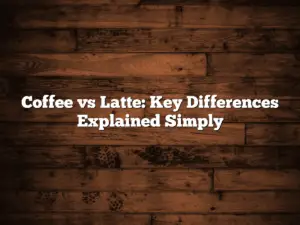As an Amazon Associate CoffeeXplore.com earns from qualifying purchases.
Does Tea Have More Caffeine than Coffee?: Coffee vs Tea
Ever wondered, does tea have more caffeine than coffee?
It’s a question that probably popped into your head as you tried to decide between a comforting cup of tea or that much-needed shot of espresso. We all have our preferences when it comes to getting our caffeine fix, and the debate about which has more caffeine — tea or coffee — has been brewing (pun intended) for ages.
While the answer isn’t as clear-cut as we’d like, generally, coffee often packs a more significant caffeine punch than most teas. But like everything in life, there are nuances. And, it’s these nuances we’ll be diving into today. Stick around, and you’ll soon be the go-to person in your group for all things caffeine!
Key Facts:
(Source: Expert Team Research)
- A standard 8-ounce cup of coffee contains about 95 milligrams of caffeine.
- Black tea has about 50 milligrams of caffeine per cup.
- Green tea boasts around 30 milligrams of caffeine for the same volume.
- Caffeine content in tea can fluctuate based on factors like brewing and steeping.
- Different teas (black, green, white) come with distinct caffeine profiles.
Does Tea Have More Caffeine Than Coffee?
No, coffee has more caffeine than tea. An 8-ounce cup of brewed coffee typically contains about 95 milligrams of caffeine, while an 8-ounce cup of brewed black tea typically contains about 50 milligrams of caffeine. However, the caffeine content of tea can vary depending on the type of tea, the brewing method, and the steeping time. So, it is always best to check the caffeine content of the specific tea you are drinking.
However, factors like brewing methods and steeping times can swing these numbers. For instance, over-steeping your black tea might just amp up its caffeine content. But does it surpass coffee? That’s the million-dollar question.
Caffeine of Tea vs Coffee
Here is the table of caffeine content in Coffee vs Tea:
| Drink | Caffeine (mg per 8 ounces) |
|---|---|
| Coffee | 95 |
| Black tea | 50 |
| Green tea | 35 |
| White tea | 25 |
| Oolong tea | 30 |
| Pu-erh tea | 45 |
| Yerba mate | 85 |
As you can see, coffee has the most caffeine, followed by black tea, oolong tea, and yerba mate. Green tea, white tea, and pu-erh tea have the least caffeine.
It is important to note that the caffeine content of tea can vary depending on the type of tea, the brewing method, and the steeping time. So, it is always best to check the caffeine content of the specific tea you are drinking.
Is Coffee Better than Tea?
Coffee and tea are both popular beverages that have been enjoyed by people for centuries. They both contain caffeine, which can help to improve alertness and focus. However, there are some key differences between the two drinks.
Coffee has a higher caffeine content than tea, so it can give you a more immediate energy boost. However, it can also make you feel jittery or anxious if you are sensitive to caffeine. Tea has less caffeine, but it also contains other compounds that can have beneficial effects on health, such as L-theanine, which can help to promote relaxation.
So, which is better for you coffee or tea? It depends on your individual needs and preferences. If you are looking for a quick energy boost, then coffee is a good choice. If you are looking for a drink that can help you to relax and focus, then tea is a better option.
Caffeine in Coffee: Diving into the Beans
Coffee’s caffeine content isn’t just about the beans but also how you prepare it. Arabica and Robusta, the two main types of coffee beans, contain different caffeine levels, with Robusta packing more caffeine than Arabica.
However, more than just the bean type, the preparation method plays a crucial role. For instance:
Comparing Different Coffee Brews
- Espresso: Despite its intense flavor, a shot of espresso contains less caffeine than a standard cup of drip coffee. Surprised? It’s all in the brewing time and water ratio.
- Drip Coffee: This method usually extracts more caffeine, especially if you’re the kind that lets your coffee brew for a good few minutes.
Now, beyond just the wake-up jolt, coffee’s caffeine has been linked to both health perks and concerns.
Key Takeaway: Espresso might taste more robust, but drip coffee typically has a higher caffeine content.
Tea’s Caffeine: Steeping into Caffeine
Caffeine in tea isn’t straightforward. Different teas mean different caffeine levels. So let’s spill the tea on this:
Green Tea vs. Black Tea: The Caffeine Showdown
While black tea generally has more caffeine than green tea, the difference isn’t substantial. But, beyond just caffeine, these teas differ nutritionally. Green tea is lauded for its antioxidants, especially epigallocatechin gallate (EGCG), which have been linked to several health benefits.
How Much Caffeine is in Your Teabag?
A typical teabag contains about 2 grams of tea leaves, which can have anywhere from 30 to 50 milligrams of caffeine. However, the actual caffeine content can vary depending on the type of tea, the brewing method, and the steeping time.
Ever thought of checking the caffeine content on your tea label? If not, you should. Different brands and blends can vary. As a tip, if you’re trying to cut down on caffeine, go for younger tea leaves. They typically have less caffeine than mature ones.
Factors Influencing Your Caffeine Sensitivity
Your caffeine sensitivity can be influenced by a number of factors, including:
- Your genetics: Some people are genetically more sensitive to caffeine than others.
- Your age: Children and older adults are more sensitive to caffeine than adults in their prime.
- Your weight: Caffeine is distributed throughout your body based on your weight. So, people who are overweight or obese may be less sensitive to caffeine than people who are of normal weight.
- Your liver function: Your liver is responsible for breaking down caffeine. So, people with liver problems may be more sensitive to caffeine.
- Your medication use: Some medications, such as certain antidepressants and decongestants, can increase your sensitivity to caffeine.
- Your overall health: If you are under a lot of stress or have a chronic illness, you may be more sensitive to caffeine.
We all have that one friend who can chug three coffees and still claim they’re sleepy. Why? Caffeine sensitivity.
Why Some People Feel the Buzz More Than Others
Our genes, metabolism rate, and even daily habits play a role in how we react to caffeine. Some of us metabolize it quickly, while others do not so much. This variability explains why your friend might be yawning post-coffee, while you’re bouncing off the walls.
Tea Caffeine vs Coffee: Caffeine in Other Beverages
Coffee and tea are the most common sources of caffeine in the world, but there are many other beverages that contain caffeine as well. Here is a table of the caffeine content of some popular beverages:
| Beverage | Caffeine (mg per 8 ounces) |
|---|---|
| Cola | 40 |
| Energy drink | 70-150 |
| Chocolate milk | 5-10 |
| Cocoa powder | 10-20 |
| Red bull | 80 |
As you can see, coffee has the most caffeine, followed by yerba mate, black tea, and energy drinks. Tea has less caffeine than coffee, but it still provides a good source of energy. Other beverages, such as cola, chocolate milk, and cocoa powder, also contain caffeine, but in much lower amounts.
FAQs About Does Tea Have More Caffeine Than Coffee?
How much tea is equal to coffee in terms of caffeine?
A rough estimate suggests that two cups of black tea equal the caffeine in one cup of coffee.
Which tea is highest in caffeine?
Black tea usually tops the list in caffeine content among teas.
Is tea better for anxiety than coffee?
Yes, tea, especially green tea, contains L-theanine, which promotes relaxation without drowsiness.
What kind of tea has the most caffeine?
Among the common types, black tea tends to have the highest caffeine content.
Summary
To answer the burning question, does tea have more caffeine than coffee? Coffee typically has more caffeine than tea, but various factors can influence the caffeine content in both. The debate between tea and coffee isn’t just about caffeine; it’s about preference, taste, and how each beverage makes you feel. Which is better? That’s your brew to choose!
What will it be for you today, a cup of tea or coffee? 🍵☕




